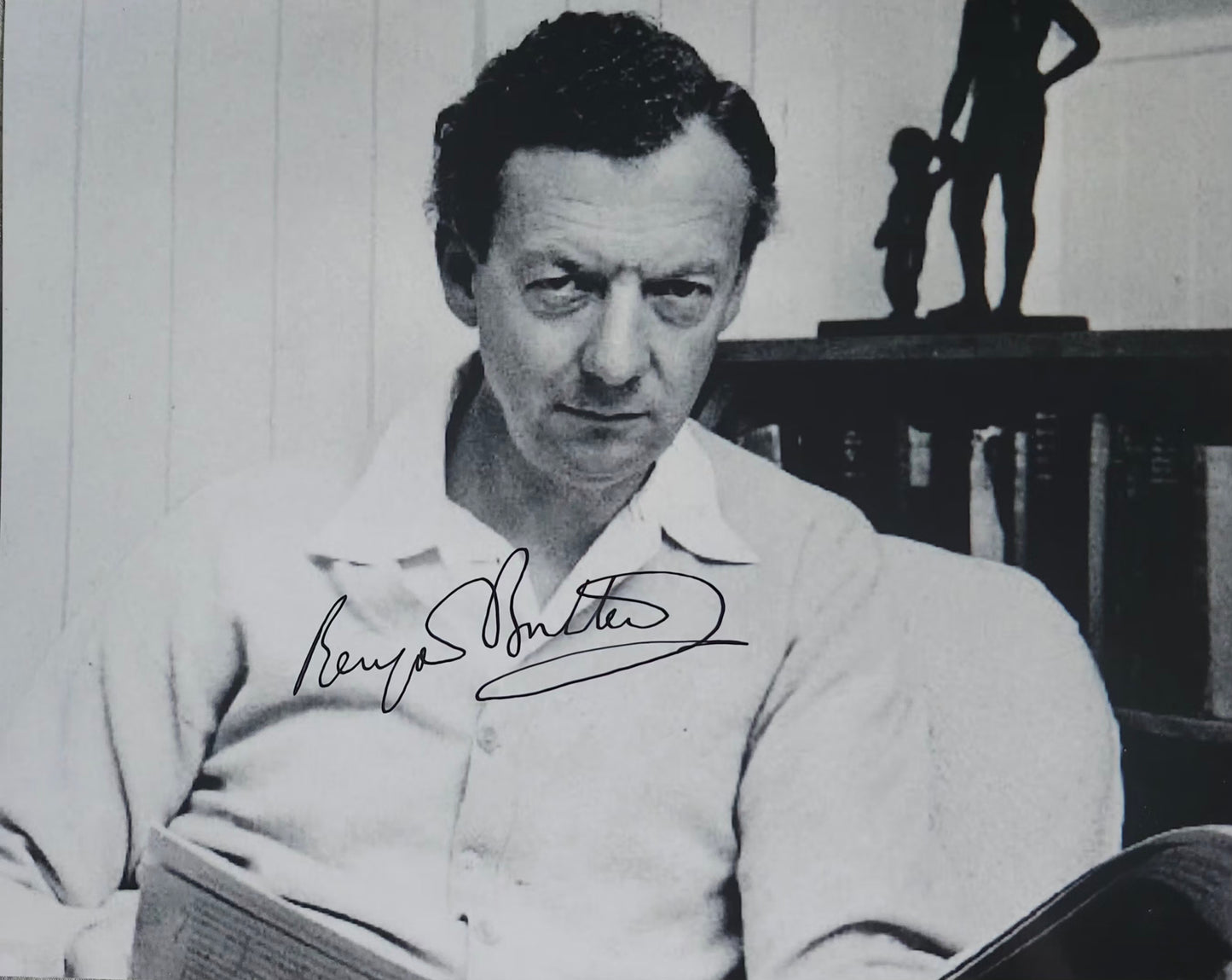BRITTEN BENJAMIN Signed Autographed Photo
BRITTEN BENJAMIN Signed Autographed Photo
Couldn't load pickup availability
Britten Benjamin signed photo, complete with numbered certificate document and hologram noting signature date and location. The photo size is 7.9x9.9 in.
Unveiling the Genius: A Deep Dive into the Life and Works of Benjamin Britten
Benjamin Britten stands as one of the most influential composers of the 20th century. Born in 1913 in Lowestoft, England, his music reflects a deep understanding of human emotion and social issues. Britten's impact on the world of classical music is profound, offering rich operas and poignant vocal works that continue to resonate Today. This article explores his life, key compositions, and the lasting legacy he left behind.
Early Life and Influences
Childhood and Musical Beginnings
Britten's journey into music began in his childhood. His mother introduced him to the piano, while his father, a local teacher, encouraged his early compositions. By the age of five, he had already written his first piece, a melody that showcased his potential. Britten's childhood experiences in coastal England greatly inspired his works, particularly his connection to the sea and the natural world around him.
Education and Mentorship
Britten's formal education began at the Royal College of Music in London. Here, he learned under mentors like Frank Bridge, who played a crucial role in shaping his early style. Britten absorbed various influences, ranging from English folk music to the broader Western classical tradition. His studies not only developed his technical skills but also ignited a passion for innovation within the realm of music.
Early Compositions and Style Development
In his youth, Britten composed several notable pieces that hinted at his unique voice. Works like Young Apollo and Variations on a Theme of Frank Bridge showcased his innovative approach to orchestration and harmony. These early compositions reflected a blend of lyrical melodies and complex structures, laying the foundation for his later masterpieces.
Wartime Works and Artistic Maturity
Impact of World War II
The tumult of World War II significantly shaped Britten’s music. The themes of loss, struggle, and survival permeated his works. Pieces such as Sinfonia da Requiem and War Requiem directly address the horrors of war, exploring deep emotional narratives and human suffering.
Peter Grimes and the Aldeburgh Festival
Britten's opera Peter Grimes, premiered in 1945, marked a turning point in his career. This groundbreaking work not only established him as a leading composer of opera but also laid the groundwork for the Aldeburgh Festival, which he co-founded with his partner, Peter Pears. The festival served as a platform for new works and drew attention to contemporary music.
Collaborations and Artistic Partnerships
Britten's partnership with tenor Peter Pears was vital. Their collaboration on operas and song cycles highlighted their mutual respect and deep understanding of each other's artistry. Works like The Rape of Lucretia and The Turn of the Screw exemplify this synergy, weaving complex stories through haunting melodies.
Key Works and Musical Innovations
Operas
Britten's operas are pivotal in the classical repertoire. Billy Budd explores themes of duty and betrayal, while A Midsummer Night's Dream reinterprets Shakespeare with a whimsical touch. Death in Venice delves into the complexities of art and mortality, showcasing his mastery of orchestration and emotional depth.
Vocal Works
His contributions to vocal music are equally remarkable. Serenade for Tenor, Horn and Strings stands out for its lyrical beauty and intricate interplay between voice and instruments. Britten’s song cycles, like Nocturne and Winter Words, reflect his keen insight into the human experience, combining poetry with music seamlessly.
Orchestral and Instrumental Works
Britten’s orchestral works, such as Young Person's Guide to the Orchestra, demonstrate his skillful use of timbre and thematic development. His instrumental pieces often blend traditional forms with modern innovations, creating rich soundscapes that captivate audiences.
Britten's Legacy and Lasting Influence
Post-War Impact
Britten’s music significantly influenced the post-war musical landscape. His commitment to social themes and emotional narratives resonated with audiences, paving the way for future composers to explore similar subjects. His operas remain central to major opera houses worldwide.
Britten Today
Today, Britten’s works are frequently performed and studied. From major orchestras to small chamber groups, his music continues to inspire musicians and audiences alike. Statistics indicate that his operas and orchestral works constitute a large segment of the contemporary classical repertoire.
Influence on Contemporary Composers
Many contemporary composers cite Britten as a major influence. Figures such as Sir Harrison Birtwistle and Thomas Adès draw inspiration from his innovative approaches and thematic concerns, ensuring his legacy remains vibrant in today’s music scenes.
A Deeper Look into Specific Themes and Motifs
Exploration of Human Nature
Britten's works frequently explore themes such as innocence, guilt, and redemption. In Peter Grimes, the conflict between societal expectations and personal truth is palpable. This introspection invites listeners to reflect on their own moral dilemmas.
Homosexuality and Social Commentary
Britten's music often reflects his personal experiences, including his sexuality. Works like Death in Venice address themes of love and loss with subtlety, offering poignant social commentary relevant to his time and today.
Musical Style and Technique
Britten's unique style features a blend of dissonance and melody, creating tension and resolution that engages listeners. His innovative use of rhythm and harmony allows for a distinct musical language that is both accessible and profound.
Conclusion
Benjamin Britten's contributions to music are immense and far-reaching. His ability to intertwine personal, social, and emotional themes within his works made him a transformative figure in 20th-century music. The impact of his art is felt today, inspiring new generations to explore the depths of human experience through music. Britten's legacy endures, ensuring his place in musical history remains secure.
All of our Certificates of Authenticity ( COA ) state the location and date of where the autograph/signature was obtained. We are the only dealer as far as we know that provides this information with every item! In the hobby of memorabilia, this is very important.Share


